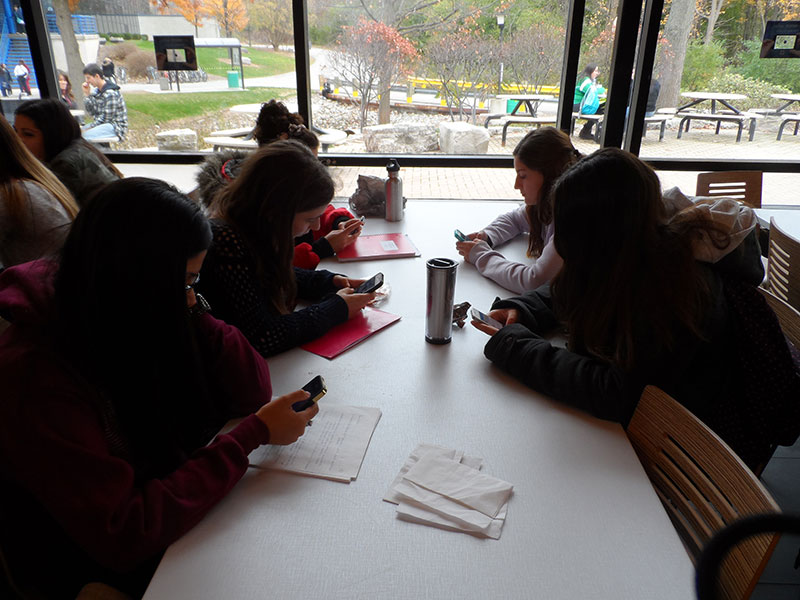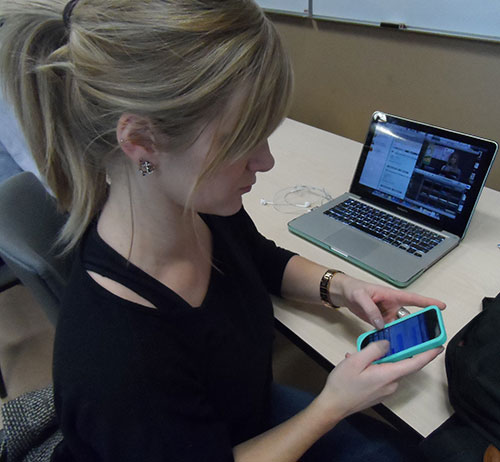STORY, PHOTOS AND INFOGRAPHIC BY JESSICA BEAULIEU
It’s been said that the first step to recovery is admitting you have a problem.
Ladies and gentlemen, my name is Jessica Beaulieu and I’m a nomophobe. Nomophobia is the term coined by social scientists in the U.K., after conducting a study on cell phone usage, which refers to the fear or anxiety caused by being separated from the user’s mobile device.
I send and receive about 9,000 text messages a month, averaging around 350 a day.
From the moment I wake up until the time I go to sleep, my iPhone is never out of reach. I eat, talk, drive, learn and work with my telecommunications device in hand.
And it turns out I’m not alone.
I’m merely one of the growing number of cell phone obsessed members of society.
A 2012 study done by Time magazine reported that 84 per cent of respondents could not go a single day without their phones.
I decided to try for three.
I decided I was stronger than my addiction, I decided to stop being a slave to the cell and I decided to challenge myself to put it away for the weekend.
“We’re all quite glued to them. You don’t go out your front door without checking if it’s there,” said Sheridan communication, culture, and information technology professor Michael Jones. “Everyone does this; you check your keys, you check your wallet and you check your phone.”
Twenty per cent of participants in the Time study check their phones every 10 minutes and 66 per cent of respondents said they would rather take their mobile phones to work with them instead of their lunch.
“I’m pretty much addicted,” said Chay Lee, a fourth-year art and art history student. “I’d say I spend about four hours a day on my phone.”
We are becoming a society completely and entirely devoted to our phones.
“I see it on a daily basis, nobody can actually talk to each other,” said Katlyn Alcock, a second-year advertising and marketing communications student. “We’ve lost all face-to-face communications skills.”
I work part time as a bartender so I also bear witness to this lack of interpersonal interaction.
I walk up to table after table of friends, family members and couples who sit there silently with their heads down, texting someone else or playing Candy Crush instead of having an actual conversation with the person across the table.
“It changes the dynamics of how we communicate with one another. It’s affected our use of language,” said Jones. “We’ve become accustomed to communication in much smaller bits, and you end up having social issues.”
After reading all the disheartening facts and articles, after watching all the videos and seeing all the real-life evidence to support the argument that we spend too much time on our phones, I decided to put mine away for the weekend.
What followed were the most frustrating and liberating three days of my young life.
I copied down some numbers that I thought might come in handy over the weekend, I nailed down plans to try to avoid confusion, I alerted loved ones that I was going off the grid and for the first time since I bought it, I powered down my iPhone.
It took mere moments for the separation anxiety to set in.
“We’ve become accustomed to this constant stream of information,” said Jones. “It even shocks me how much you want it when it’s missing.”
I reached for the phone in seven minute intervals, I felt so disconnected, so alone, yet so peaceful.
Without the interruption of my ringtone every two minutes, without someone’s Instagram photo to “like” or some stranger’s Facebook page to get lost in, my productivity level increased exponentially.
I started finding extra minutes hidden throughout my day-to-day activities. Something that would normally take me an hour to get done was easily achieved in under 45 minutes.
I was efficient. I was well rested. I was organized.
I felt like Bradley Cooper in Limitless.
But then there would be a lull in my daily routine, and I’d come face to face with boredom. My friend was 27 minutes late to meet for a lunch date and I was left reading the lunch menu, the drink menu and a ketchup bottle.
And then there was the night I went out for a friend’s birthday celebration and was the only one not connected to the outside world via cellphone.
All my friends sat around a table, texting boyfriends or parents or liking the Facebook status of a person they hadn’t seen in seven years.
And that’s when I opened my mouth, and my mother’s voice came out, “I’m sorry, is my company boring you?”
It was a question I had heard and rolled my eyes at countless times before, and a question I now fully understood.
Maybe that’s how respondents to the Time survey felt when 60 per cent said their phones had come between them and their spouse.
Forty-four per cent of respondents used their phones while playing with their children, 67 per cent while at a party, 61 per cent while watching TV and 75 per cent while they went to the bathroom.
“It’s becoming very difficult for people to decouple from their phones and that’s what’s going to cause people a lot of stress,” said Jones. “That it’s perfectly fine to not be here and to not be connected right now is something that society needs to work towards, in order to give us all some space.”
And while I was pleasantly surprised by many things about my weekend, like the calming sensation of being out of reach even if I didn’t want to be, and the surprise in-house visit by a friend of mine who just wanted to chat, I still eagerly powered my phone up at the end of my weekend social experiment.
I had been thinking more clearly, listening more intently, focusing harder and driving safer than I had in years. But I now had days of social media and networking to catch up on and now that I had the phone back in my hands, I was itching for my fix.
When I went to sleep that night I once again shamefully counted myself among the 50 per cent of people who sleep with their phones in bed next to them.
Ladies and gentlemen, my name is Jessica Beaulieu, and I’m a nomophobe.
But wait! There’s more….
Check out some of the startling stats on cell phones[modal id=”15038″ style=button color=default size=default]here.[/modal]
Hear the always hilarious Louis C.K.’s opinion on cell phones here.
This video will make you wish you weren’t so attached to your phone. It’s so true to life it breaks your heart.
Infographic Sources:
http://www.huffingtonpost.com/2012/05/08/nomophobia-cell-phone-addictio_n_1500670.html
http://timesofindia.indiatimes.com/tech/personal-tech/computing/Nomophobia-The-worlds-biggest-tech-phobia/articleshow/13053777.cms


Comments
One response to “Three days, no phone – anxiety ensues”
Hi Jessica,
Great article, and study! I like your ambition to break through the “control” these cell phones seem to have on our lives. Many of the young adults I see in my office yearn for more social interaction, new relationships, and more human contact – but feel lost with how to achieve it. I ultimately encourage, “initiate more real-life conversation”!
Here’s to creating a movement for more interpersonal connections! 🙂
Warm regards,
Ashley